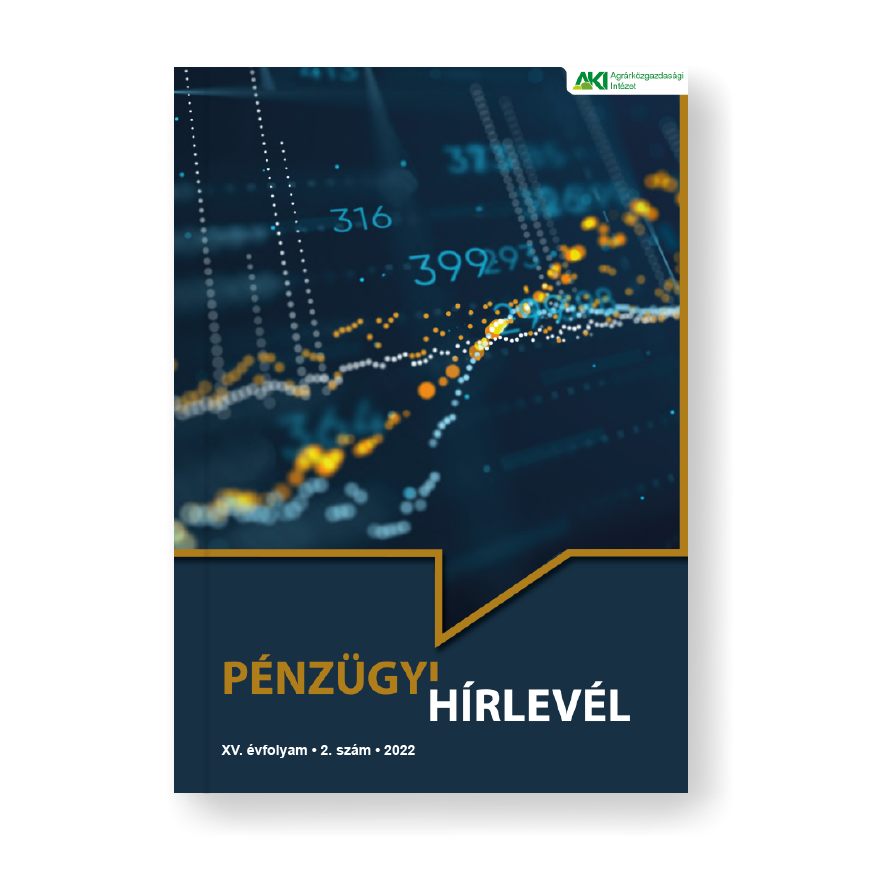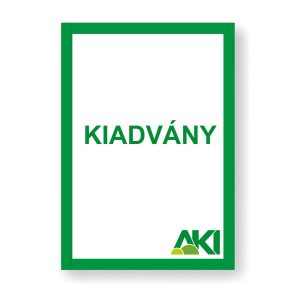Leírás
Agrár- és vidékfejlesztési támogatásokra 260,4 milliárd forintot fizettek ki március 31-ig.
A folyósított támogatási összeg 78,7 százaléka (204,8 milliárd forint) európai uniós forrásból származott, 21,3 százalékát (55,6 milliárd forint) hazai költségvetésből fizették ki.
A korábbi évekhez hasonlóan továbbra is a termelőknek nyújtott közvetlen támogatások (134,3 milliárd forint) domináltak az agrár- és vidékfejlesztési támogatások között.
A Vidékfejlesztési Program kifizetései 2022 első negyedévében meghaladták a 92 milliárd forintot. A nemzeti támogatásokra 30,2, a piaci és egyéb támogatásokra együttesen 3,1 milliárd forintot folyósítottak az év első három hónapjában.
Az egyes ágazatok támogatottságát vizsgálva elmondható, hogy a szántóföldi növénytermesztés részesedése volt meghatározó már 2022 első negyedévében is, a támogatások több mint 40 százalékát kapta az ágazat, míg az állattenyésztők a támogatások alig egyötödét használhatták fel, a kertészet részesedése pedig csupán 4,1 százalék volt.
A nemzeti agrárkárenyhítési rendszer keretében (I. pillér) a 2021. évi időjárás okozta károk kompenzálására nagy összegű kárenyhítést, 11,2 milliárd forintot folyósítottak 2022-ben a jogosult termelők számára.
A mezőgazdaság hitelállománya 9,7 százalékkal 899,7 milliárd forintra emelkedett az előző év azonos időszakához képest. A kedvezményes hitelek súlya tovább nőtt az ágazatban, a piaci hitelek részesedése mindössze 13,4 százalékot tett ki 2022. március 31-én.
A mezőgazdaságban tevékenykedő egyéni gazdaságok hitelállománya mérsékelten nőtt, 3,3 százalékkal 376,5 milliárd forintra bővült. A hitelállományon belül a beruházási hiteleknél jelentkezett a legnagyobb növekedés. A hitelek zöme a szántóföldi növénytermesztőket finanszírozta. A mezőgazdaságban tevékenykedő egyéni vállalkozások 19,4 milliárd forint új hitelt vettek fel 2022 első negyedévében, ami 1,4 milliárd forinttal volt több, mint egy évvel korábban.
A mezőgazdasági társas vállalkozások hitelállománya 14,8 százalékkal 523,2 milliárd forintra emelkedett. A növekedés az éven túli hiteleknél jelentkezett, azon belül is a beruházási hitelek állománygyarapodása volt meghatározó, amely ütemét és értékét tekintve is meghaladta a hosszú lejáratú forgóeszközhitelekét. A hitelállományból legnagyobb mértékben az állattenyésztési ágazat részesedett. A mezőgazdasági társas vállalkozások újonnan felvett hiteleinek összege csupán 0,4 milliárd forinttal haladta meg az egy évvel korábbi értéket.
A mezőgazdaság garantált hitelállománya dinamikusan nőtt. A lízingcégek szerződésszáma és a tőkekintlévőség összege is mérséklődött.
Az élelmiszeripar hitelállománya a mezőgazdaságétól kisebb ütemben, mindössze 4,0 százalékkal bővült, ezáltal 652,2 milliárd forintra emelkedett 2022 első negyedévének végére. Az állományban a kedvezményes hitelek domináltak, az ágazat hiteleinek több mint 60 százalékát kedvezményes finanszírozás keretében folyósították.
Az egyéni vállalkozások hitelállománya 22,3 százalékkal haladta meg az előző év azonos időszaki értékét, ezáltal 7,5 milliárd forintra bővült, a társas vállalkozásoké 3,9 százalékkal 644,6 milliárd forintra nőtt. Ez utóbbi állományában az egyéb hitelek növekedése volt kiemelkedő, amelyet a beruházási hitelek állománygyarapodása követett.
Az élelmiszeripari társas vállalkozások hitelállományának legnagyobb részét (26,4 százalékát) az ún. egyéb élelmiszeripar szakágazatban tevékenykedő vállalkozások adták, 12,6 százalékát az egyéb gyümölcs-, zöldségfeldolgozás, -tartósítással foglalkozók, 9,8 százalékát pedig a húsfeldolgozás, tartósítás szakágazatban tevékenykedők tudhatták magukénak.
Az élelmiszeripari társas vállalkozások 20,7 milliárd forinttal kevesebb hitelt vettek fel 2022 első negyedévében, mint egy évvel korábban. Az újonnan felvett hitelösszeg zöme egyéb éven belüli hitel volt és az egyéb élelmiszer szakágazatba érkezett. Az ágazat garantált hitelállománya tovább bővült.
A total of HUF 260.4 billion was paid for agricultural and rural development subsidies by 31 March. 78.7 per cent (HUF 204.8 billion) of the subsidies came from European Union funds, and 21.3 per cent (HUF 55.6 billion) was paid from domestic budget.
As in previous years, direct payments to farmers (HUF 134.3 billion) continued to dominate in agricultural and rural development payments. Payments for the Rural Development Program in the first quarter of 2022 exceeded HUF 92 billion. Farmers received HUF 30.2 billion in national subsidies, and HUF 3.1 billion in market and other subsidies in the first three month of the year.
Examining the support of each sector it can be considered that the share of arable crop production was decisive in the first quarter of 2022 as well, the sector received more than 40 per cent of the support, while livestock farmers could use one-fifth of the support and the share of horticulture was only 4.1 per cent.
Under the national agricultural compensation scheme (Pillar I), a high amount of compensation, HUF 11.2 billion was paid to eligible farmers in 2022 to compensate for the damage caused by the weather in 2021.
The amount of credit in agriculture increased by 9.8 per cent to HUF 895.0 billion compared to the same quarter of the previous year. The amount of subsidised loans continued to grow in the sector, the share of market loans was only 14.1 per cent on December 31, 2021.
The amount of credit in agriculture increased by 9.7 per cent to HUF 899.7 billion compared to the same quarter of the previous year. The amount of subsidised loans continued to grow in the sector, the share of market loans was only 13.4 per cent on March 31, 2022.
The credit amount of the individual farms grew moderately, by 3.3 per cent to HUF 376.5 billion. Investment capital loans grew at the fastest rate. Most of the credit was used to finance arable crop growers. The value of new loans of individual farms in agriculture was HUF 19.4 billion, which was HUF 1.4 billion higher than in the previous year.
The credit amount of the agricultural enterprises increased by 14.8 per cent to HUF 523.2 billion. The increase was mainly for long-term loans, within this the growth of investment capital loans exceeded the growth of long-term working loans in terms of the pace and value. The livestock sector accounted for the largest share of the credit. The amount of new loans taken out by agricultural enterprises was only HUF 0.4 billion higher than in the previous year.
The guaranteed loans of agriculture have grown dynamically. At the same time the contract number of leasing companies and their capital adequacy in the sector also decreased.
In the food industry, the amount of credit grew at a slower pace than in agriculture, by only 4.0 per cent to HUF 652.2 billion in the first quarter of 2022. More than 60 per cent of the credit amount was subsidised loan.
The credit amount of the individual food companies increased by 22.3 per cent to HUF 7.5 billion, while the credit amount of corporate enterprises rose by 3.9 per cent to HUF 644.6 billion, in which the growth of other loans was outstanding, followed by the investment loans. Biggest part (26.4 per cent) of the loans in the food industry were granted for food corporations operating in so-called other food industry sector, 12.6 per cent were disbursed for processing and preserving other fruits and vegetables, and 9.8 per cent for processing and preserving meat.
Food enterprises took out HUF 20.7 billion less loans in the first quarter of 2022 compared to the previous year. The majority of the credit amount was other short-term loans and was disbursed for so-called other food industry sector. The sector’s guaranteed loans continued to expand.


